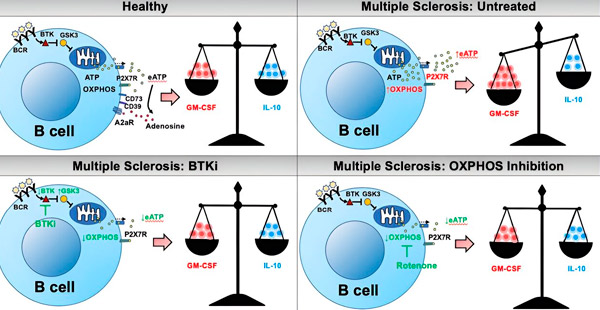B cells can be modified to prevent symptoms of multiple sclerosis
Sist anmeldt: 14.06.2024

Alt iLive-innhold blir gjennomgått med medisin eller faktisk kontrollert for å sikre så mye faktuell nøyaktighet som mulig.
Vi har strenge retningslinjer for innkjøp og kun kobling til anerkjente medieområder, akademiske forskningsinstitusjoner og, når det er mulig, medisinsk peer-evaluerte studier. Merk at tallene i parenteser ([1], [2], etc.) er klikkbare koblinger til disse studiene.
Hvis du føler at noe av innholdet vårt er unøyaktig, utdatert eller ellers tvilsomt, velg det og trykk Ctrl + Enter.

B cells can control myeloid cell responses through the release of certain cytokines (small proteins that control the growth and activity of immune system cells), challenging the previously held view that only T cells coordinate immune responses.
In people with multiple sclerosis (MS), abnormally active breathing in B cells stimulates pro-inflammatory responses in myeloid cells and T cells, leading them to attack the protective sheath (myelin) ) coats nerve fibers, causing nerve damage and MS symptoms.
A new class of drugs called Bruton's tyrosine kinase (BTK) inhibitors may reverse this abnormal B cell breathing and stop the signals that lead to MS flare-ups. The study, conducted by the Perelman School of Medicine at the University of Pennsylvania, was published in Science Immunology.
"Experts previously believed that T cells are the primary orchestrators of responses from other types of immune cells, and that MS is primarily caused by over-activated T cells," said Dr. Amit Bar-Or, professor of neurology and director of Penn State's Center for Neuroinflammation and Neurotherapeutics. University.
"This study highlights that what really matters is how different cell types interact, and that B cells modulating myeloid cells play a much more active role in the immune systemthan we thought."
A healthy immune system constantly responds to stimuli by activating or suppressing immune responses, in part through the release of various cytokines that tell other cell types how to respond. Typically, every immune reaction causes a counter-reaction, and this constant "push and pull" helps maintain the correct balance between immune reactions.
In this way, the human immune system can, on the one hand, respond to infection, but also ensure that the reaction does not become overactive and cause harm to the body, as can happen in autoimmune diseases such as MS.
In this study, the researchers used both human samples and mouse models of MS to show that not only do cytokine signals between B cells and T cells go awry in MS, but that the B cells of MS patients produce abnormal cytokine profile that causes myeloid cells to generate an inflammatory response.
They found that all of these actions could be traced back to metabolic dysregulation in a process in B cells called oxidative phosphorylation, a type of mitochondrial respiration. The researchers found that normal B cells can break down oxygen and release chemical energy signals that cause a further reaction in the B cells themselves and then also in myeloid cells, telling them to mount a pro- or anti-inflammatory response.
However, when this B cell metabolism is overactive, as is the case in MS, the signals lead to abnormal myeloid and T cell responses that are associated with exacerbations of MS symptoms.

Metabolic regulation of cytokine production by B cells: implications for the pathogenesis and therapy of MS. Source: Science Immunology (2024). DOI: 10.1126/sciimmunol.adk0865
"An exciting approach for new treatments for multiple sclerosis may be to partially suppress respiration in B cells, which could stop the cascade of interactions between immune cells that causes inflammation and MS activity," Bar-Or said.
The authors previously showed that a new class of drugs called BTK inhibitors does just that. These agents slow down overactive B cell respiration and "calm" the B cells of MS patients so that they do not release the same abnormal cytokine profile that causes abnormal pro-inflammatory responses in myeloid cells and T cells.
Current treatments for MS, such as anti-CD20 therapies, deplete B cells. However, as B cells are destroyed, the patient's immune system may be compromised, making it difficult to respond to infections or vaccinations. In contrast, BTK inhibitors do not deplete B cells but correct the metabolic abnormality, making B cells less likely to provoke proinflammatory responses in other cells.
